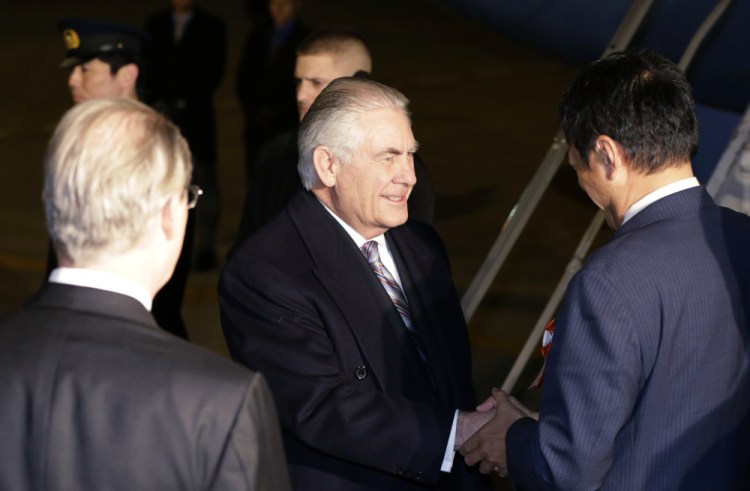As Secretary of State Rex Tillerson arrived in Asia on Wednesday for his first major trip, one of his loudest messages could be one that goes unspoken.
State Department officials said Tillerson’s focus during meetings in Japan, South Korea and China will be on North Korea’s nuclear threat, as well as trade and economics. But his aversion to dealing with U.S. journalists – and his decision to initially bar them from his traveling party before granting a seat to a reporter for a conservative website at the last minute – have added to growing questions about the Trump administration’s commitment to a free press and transparent government.
For the nation’s top diplomat, the approach cuts sharply against the practice of his predecessors in both Republican and Democratic administrations who have allowed reporters on their planes as an expression of American values – and as a tool to help pressure authoritarian regimes toward political reforms and greater openness.
Tillerson’s abrupt change of direction comes at a time when his boss, President Trump, and other senior White House officials have referred to mainstream media outlets as “fake news,” “the opposition party” and “the enemy of the people,” and the White House has restricted access to some news briefings.
Foreign capitals have taken notice. Tamaki Tsukada, spokesman for the Japanese embassy in Washington, said “there is an elevated concern in the Japanese media about that level of control” that Trump is trying to exert on the U.S. news media.
The Trump administration’s posture also has been noted in Beijing, where Communist Party leaders have appropriated Trump’s own rhetoric as they continue a years-long effort to tighten government control of news and information. That effort has included restricting public access to the internet, jailing Chinese journalists and denying visas to American reporters.
This month, Xinhua, a state-run news agency, attacked foreign news outlets for writing “fake news” full of “cleverly orchestrated lies” in their reports of the torture of a human rights lawyer by government agents.
“We’re in a period where Chinese government pressure on journalists is as great as it’s been since the 1980s, so having a secretary who raises the importance of a free press and the treatment of journalists is important,” said Rebecca MacKinnon, a former journalist based in Beijing who oversees a project at the New America think tank that examines digital privacy rights and free expression.
“It’s been a key part of our foreign policy for decades for Republicans and Democrats,” MacKinnon said. “If that changes or if the message is not conveyed … that sends a message not just to the world and the Chinese government, but also to Chinese journalists, human rights lawyers and activists.”
Tillerson, who regularly traveled with a single aide while serving as chief executive of ExxonMobil, is said to be uncomfortable with the large entourage of U.S. officials, reporters and security personnel that typically accompanies the secretary of state. This is his third trip abroad on a small plane, with less space for staff and for reporters. State Department officials have characterized it as a cost-cutting measure, though news organizations pay for their own expenses.
Tillerson’s aides emphasized that they have made arrangements to permit American reporters, who travel on their own or are based abroad, to cover his stops in each capital. And they said he will participate in his first news conference during a joint appearance with Japanese Foreign Minister Fumio Kishida in Tokyo on Thursday.
The only journalist on the plane is Erin McPike, a reporter for the Independent Journal Review, an Alexandria-based website founded by two former Republican operatives. “We take this responsibility seriously,” the publication’s founder, Alex Skatell, said. McPike, who is listed on the website as a White House correspondent, was invited by the State Department to cover the trip, Skatell said.
Administration officials rejected the suggestion that the Chinese would view Tillerson’s exclusion of other reporters as a signal that the administration would tacitly endorse – or choose to overlook – their intimidation tactics against journalists.
Copy the Story LinkSend questions/comments to the editors.



Success. Please wait for the page to reload. If the page does not reload within 5 seconds, please refresh the page.
Enter your email and password to access comments.
Hi, to comment on stories you must . This profile is in addition to your subscription and website login.
Already have a commenting profile? .
Invalid username/password.
Please check your email to confirm and complete your registration.
Only subscribers are eligible to post comments. Please subscribe or login first for digital access. Here’s why.
Use the form below to reset your password. When you've submitted your account email, we will send an email with a reset code.